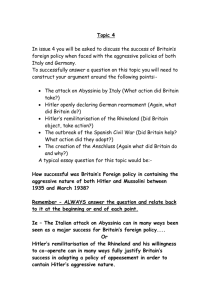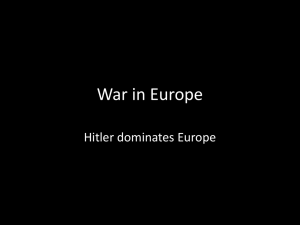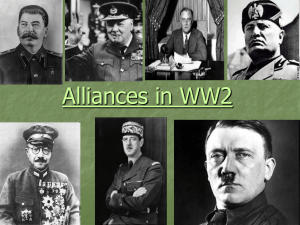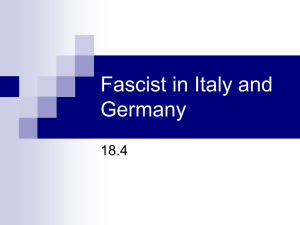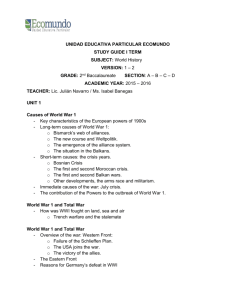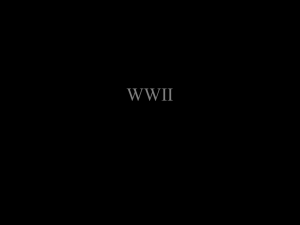Section 3: Why did war break out
advertisement
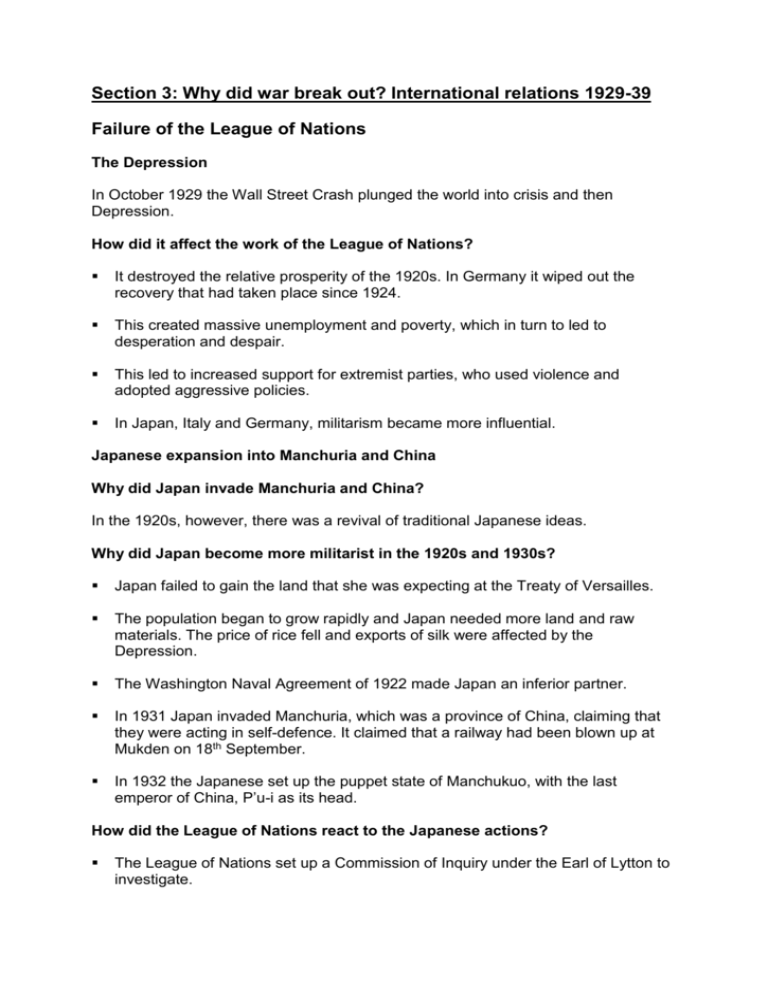
Section 3: Why did war break out? International relations 1929-39 Failure of the League of Nations The Depression In October 1929 the Wall Street Crash plunged the world into crisis and then Depression. How did it affect the work of the League of Nations? It destroyed the relative prosperity of the 1920s. In Germany it wiped out the recovery that had taken place since 1924. This created massive unemployment and poverty, which in turn to led to desperation and despair. This led to increased support for extremist parties, who used violence and adopted aggressive policies. In Japan, Italy and Germany, militarism became more influential. Japanese expansion into Manchuria and China Why did Japan invade Manchuria and China? In the 1920s, however, there was a revival of traditional Japanese ideas. Why did Japan become more militarist in the 1920s and 1930s? Japan failed to gain the land that she was expecting at the Treaty of Versailles. The population began to grow rapidly and Japan needed more land and raw materials. The price of rice fell and exports of silk were affected by the Depression. The Washington Naval Agreement of 1922 made Japan an inferior partner. In 1931 Japan invaded Manchuria, which was a province of China, claiming that they were acting in self-defence. It claimed that a railway had been blown up at Mukden on 18th September. In 1932 the Japanese set up the puppet state of Manchukuo, with the last emperor of China, P’u-i as its head. How did the League of Nations react to the Japanese actions? The League of Nations set up a Commission of Inquiry under the Earl of Lytton to investigate. In October the Lytton Commission reported that there was no evidence that the Japanese had acted in self-defence and recommended that Manchuria should be an autonomous region under Chinese control. The Japanese ignored the report and the condemnation from the League and resigned in 1933. The Japanese action was a major blow to the League of Nations, not only because it failed to act effectively, but also because Japan was a Permanent Member of the Council. Why was the League unable to do anything about Manchuria? The lack of an army meant that countries had to be persuaded to declare war on Japan. Manchuria was remote and military action would be very difficult. There was very little sympathy for China and some support for Japan, which seemed to be trying to restore law and order. In reality there was very little that the League could have done. What effects did the League's actions have upon Japan? The failure to condemn Japan led to the government falling under the control of the army. Politicians who stood up to the armed forces were sometimes murdered. The country began a period of territorial expansion on the mainland. From 1932 more of China was occupied by the Japanese army. In July 1937 the Japanese army invaded northern China. The following month, two Japanese sailors were killed at a Chinese aerodrome in Shanghai. This led to the landing of an army, which captured and then forced its way inland. The Japanese air force was used to bomb Chinese cities into submission. Within a year Nanking, the capital, Tsingtao, Canton and Hankow had all been taken. Britain and the USA gave large loans to the Guomingdang government of China The Japanese government began to demand that Britain and the other western Countries should give up supporting China and co-operate with Japan in establishing a ‘new order’ in the Far East. The Japanese government intended to set up a ‘Greater South East Asia Coprosperity Sphere’. In fact this was to be nothing more than a Japanese Empire, intended to provide living space for Japan’s growing population and to enable Japan to acquire the raw materials which she desperately needed, the most crucial of which was oil. Events in Italy In October 1922, Benito Mussolini became prime minister of Italy. From 1925 he ruled as a virtual dictator. Mussolini began a series of 'battles' to try and tackle Italy's economic problems, autostrada (motorways) were built, land reclaimed and public buildings constructed. From 1929 many of Mussolini's plans began to go wrong. He rarely followed ideas through and lacked determination. His policy of increasing the value of the lira, the Italian currency, meant that Italian exports became more expensive. By the mid-1930s Italy was suffering very badly from the effects of the Depression and Mussolini was becoming very unpopular. His solution was to begin an aggressive foreign policy. The Italian conquest of Abyssinia On 3 October 1935, the Italian armed forces invaded the African state of Abyssinia (now called Ethiopia). At first the Italians faced considerable opposition, as the Abyssinians avoided a pitched battle and retreated slowly. In early 1936, however, the Italians began to use poison gas and, along with their air power, this led to the collapse of the Abyssinian forces. In May 1936 the capital Addis Ababa was occupied and the Emperor Haile Selassie fled to Britain. Abyssinia was annexed to Italy and the King of Italy became Emperor of Abyssinia. Why did Italy invade Abyssinia? Italy had invaded Abyssinia in 1895, but had been humiliatingly defeated by the Abyssinian army at the battle of Aduwa (Adowa). The 1935 invasion was revenge. Mussolini wanted an African empire to fulfil his aims to revive the Ancient Roman Empire. Mussolini also wanted to divert public opinion in Italy away from the failures of his domestic policies, which were making him increasingly unpopular. Why was the invasion of Abyssinia important? Italy was a Permanent Member of the Council of the League of Nations. The invasion deliberately broke the Covenant and severely weakened the authority of the League. How did the League react to the invasion of Abyssinia? Sanctions were applied to Italy, including an arms embargo, banning Italian imports and all financial dealings, but oil was not included. Mussolini later admitted that that was the one thing that would have forced him to withdraw. In June 1936, Haile Selassie addressed the Assembly of the League of Nations. Throughout he was heckled by Italian journalists, who whistled to try to stop him being heard. His speech had no effect. Why did the League not take effective action? In 1935, Britain and France tried to arrange a compromise solution to the crisis, the Hoare-Laval Pact. This would have allowed Mussolini to retain control of most of Abyssinia. The Pact had to be dropped as a result of hostile public opinion. This and the refusal to add oil to the sanctions made Britain and France, and the League of Nations, appear to be weak. Both Britain and France were alarmed at events in Germany and wanted to keep Mussolini on their side against Hitler. The three nations had already formed the Stresa Front in 1934. Britain and France did not want Mussolini to resign from the League of Nations. In addition to refusing to allow oil to be added to the list of economic sanctions, Britain also kept the Suez Canal open, which allowed Mussolini to ship fuel to Abyssinia The actions of Britain and France over Abyssinia did great harm to the League's reputation. Hitler’s challenges to the Peace Settlement What were the long-term consequences of the Treaty of Versailles? Germans resented the loss of territory and the demilitarisation of the Rhineland. Extremists, like Hitler, were able to play on people's fears and humiliation. It created weak coalition governments in the Weimar Republic, which were unable to cope with the Depression. It created a feeling that Germany had been treated too harshly, leading to appeasement. How did Hitler destroy the Treaty of Versailles? In 1933 Adolf Hitler ordered the German delegates to walk out of a Disarmament Conference organised by the League of Nations. He stated that Germany was prepared to disarm if other nations did so as well. He then left the League immediately afterwards. In January 1935 the people of the Saar, an area that had been administered by the League of Nations since 1920, voted by 477,000 to 48,000 to rejoin Germany. Hitler’s aim was to create a GrossDeutschland (Great Germany). He wanted to absorb all areas in which there were German speakers into a new enlarged Germany. He also wanted to expand Germany to acquire ‘lebensraum’ (living space) in the east. Rearmament In 1935 Hitler began rearmament. Conscription was reintroduced and the army, navy and air force were all built up. All members of the German armed forces had to swear an oath of allegiance to Hitler personally. The Anglo-German Naval Treaty This was an agreement that allowed Germany to build a navy up to 35% the size of Britain's. This broke the terms of the Treaty of Versailles and encouraged Hitler to go even further. The Rhineland The Rhineland had been demilitarised under the Treaty of Versailles. The Allies were to occupy the area for fifteen years, or for longer if necessary. Allied troops were withdrawn from the Rhineland in 1935. The following March Hitler reoccupied it. On 7 March 1936, Germany denounced the Locarno Pacts and reoccupied the Rhineland. The crisis over the Italian invasion of Abyssinia influenced Britain not to interfere. Hitler later commented, 'the forty-eight hours after the march into the Rhineland were the most nerve-racking of my life. If the French had opposed us we would have had to withdraw. Our forces were not strong enough even to put up a moderate resistance'. The reoccupation of the Rhineland convinced Hitler that Britain and France were unlikely to act against further aggression. Why was Hitler able to get away with the reoccupation of the Rhineland? Britain and France were concentrating on the Italian invasion of Abyssinia. Britain refused to act; one politician said that it was only Hitler going into his own backyard. The Pact of Steel In 1937, Italy left the League of Nations (the third Permanent Member of the Council to do so) and formed the Pact of Steel with Germany. Mussolini had now acted just as France and Britain had feared. Hitler also opened links with Japan and in 1939 the Axis was created with Germany, Italy and Japan. The Anschluss Anschluss meant the union of Germany and Austria, which had been specifically banned by the Treaty of St. Germain. Why did Hitler want to unite Germany and Austria? Hitler had been born in the town of Braunau-am-Inn in the former AustroHungarian Empire. He was not technically a German citizen, even though he had lived in Germany since 1913. Hitler wanted to destroy the Treaty of Versailles, which he regarded as a humiliation for Germany. This would be one way of achieving his aim. Hitler wanted to create a Greater Germany, which would include all Germanspeaking peoples. Austria was an obvious step. The first attempt at Anschluss took place in July 1934 After Hitler became chancellor there was increasing Nazi agitation in Austria, until the Nazi Party was dissolved in June. In February 1934, the chancellor of Austria, Engelbert Dollfuss, ordered attacks on the Austrian Socialist Party, which was then dissolved. From April 1934 Dollfuss began to rule as a dictator. On 25 July Nazis entered the radio station in Vienna and forced the staff to announce that Dollfuss had resigned. They then entered the chancellery and shot and killed Dollfuss. The murderers were quickly arrested by the Austrian armed forces, and Italy and Yugoslavia moved forces to the Austrian border to prevent German intervention. Between 1934 and 1938 relations between Austria and Germany deteriorated. In 1937, Mussolini also informed the new Austrian chancellor, Kurt Schussnigg, that Italy would not help Austria in the future. A second crisis over Anschluss developed in 1938 February 12 - Schussnigg met Hitler and agreed to appoint some Nazi ministers to the Austrian Cabinet. Arthur Seyss-Inquart became Minister for the Interior. March 1 - Unrest broke out in parts of Austria caused by Nazis. Soon the whole country was in chaos. March 11 - Hitler sent an ultimatum demanding the resignation of Schussnigg. German troops were massed on the border. Schussnigg gave in and SeyssInquart became chancellor. March 13 - Austria and Germany were united. April 10 - A Plebiscite was held which gave a 99.75 % majority in favour of Anschluss. Austria was immediately incorporated into the German Reich. The speed at which these events took place made reactions by Britain and France difficult. The two countries protested, but did little more, especially as Mussolini refused to join in the protests or any possible actions. The Anschluss meant that Germany now surrounded Czechoslovakia on three sides. The failure of appeasement: 1937-39 Czechoslovakia 1938 On September 12 1938 Hitler demanded self-government for the German speaking Czechs in the Sudetenland. The British prime minister, Neville Chamberlain, had been expecting Hitler to try to seize the Sudetenland for some time. He had already decided that, as soon as it happened, he would go to meet Hitler face to face and settle the matter. Chamberlain called this Plan Z. On September 15 Neville Chamberlain flew to meet Hitler at Berchtesgaden and agreed to his demands. He returned to Britain and persuaded Edouard Daladier the French prime minister of the need to support him. The Czech government was informed of Chamberlain's decision, but was not invited to the discussions. On 22 September Chamberlain returned to meet Hitler at Bad Godesberg. But Hitler now had new demands. Hitler told Chamberlain that the Sudetenland must be handed over to Germany immediately and that Polish and Hungarian claims for Czech territory must also be met. Chamberlain returned to London. He believed that war was inevitable. Evacuation began in London and 1,000,000 volunteers were called for by the government. But at the last moment war was avoided, the Italian dictator Mussolini suggested a four power conference. The four powers, Germany, Italy, Britain and France, met at Munich on 28 September 1938. They agreed to let Hitler have the Sudetenland. Hitler and Chamberlain signed an agreement that Britain and Germany would never go to war again. This was Appeasement. Was the policy of appeasement justified? Appeasement was the belief that the Dictators could be pacified if their demands were met. Changing Attitudes towards Hitler With hindsight it is obvious that Hitler was very dangerous indeed, but in the 1930s some people saw things differently. There was a strong view that the Treaty of Versailles had been too harsh and that, therefore, it was not unreasonable to allow Hitler to break some of the terms. Britain had already allowed Germany to build more warships because the reduction of the German forces in 1919 was thought to be too severe. Hitler was also admired by some people for the way that he had rebuilt Germany after 1933. Unemployment was cut from 6,000,000 to 500,000 and industrial production rose dramatically. This was in comparison to events in Britain where the government seemed to be doing very little. Until the late 1930s the worst aspects of the Nazi rule were not made public. The Olympic Games in Berlin in 1936 were used as giant propaganda exercise. Visits to Germany were organised for groups of ex-servicemen from Britain where they were introduced to Hitler. He explained how reasonable his demands were. Fears of War In the 1930s more and more attention was paid to what future war would be like. People became more and more convinced that bombing would be highly dangerous. Added to this was the fear of poison gas, which had been used for the first time during the First World War. Bombers, high explosive and poison gas meant that the war would affect people in Britain far more than ever before. Rearmament Many people saw the RAF as Britain’s main defence and by the mid-1930s the RAF had few modern planes. This was seen by many people as a strong argument for avoiding war at all costs. Britain needed time to build up her defences against Germany. Memories of the First World War Probably the most important reasons for Appeasement were the British people’s memories of the Great War, as it was known until the Second World War. What had made these memories all the more vivid was the fact that in 1914 the war had been greeted with great enthusiasm. By 1918, however, there were very few people who did not view the war with horror. Why did French governments support Appeasement? French governments were more inclined to oppose Hitler in 1936-38, but were afraid to do so without support from Britain. France was dominated by the Popular Front, a left wing coalition, until 1938. This supported the policy of non-aggression. Most French governments were coalitions, which made firm action difficult. Events in 1939 In March 1939, Hitler occupied most of the rest of Czechoslovakia. This was a clear violation of the Munich Agreement and showed that Hitler was not just aiming to unite all German speakers in a Greater Germany. March 1939 Britain made defensive alliances with Poland and then Romania. These meant that if either country was attacked Britain would go to war to defend them June – August 1939 France, Britain and the Soviet Union discussed an alliance against Hitler. August 1939 Germany and the USSR signed the Nazi-Soviet Pact. The Nazi-Soviet Pact On the face of it the Nazi-Soviet Pact was a simple non-aggression pact between the two countries. They both agreed not to attack the other. Until then, Hitler and Stalin had been bitter enemies and the agreement astounded politicians throughout Europe. It was clearly the prelude to something dramatic. In fact there were a number of secret clauses that were not public. The Soviet Union agreed not to interfere when Germany attacked Poland and also would allow Hitler a free hand in Western Europe. In return, Germany would allow the Soviet Union to occupy eastern Poland and would not interfere if Stalin occupied the Baltic States and Finland. It was, therefore, a cold-blooded and calculated agreement to interfere in the lives of helpless and innocent people. 25 August 1939 Britain responded by signing a formal alliance with Poland. 1 September 1939 Germany invaded Poland. 2 September 1939 The British Government sent an ultimatum to Germany demanding that all forces should be withdrawn from Poland or war would be declared. This was ignored. 3 September 1939 Britain declared war on Germany.


